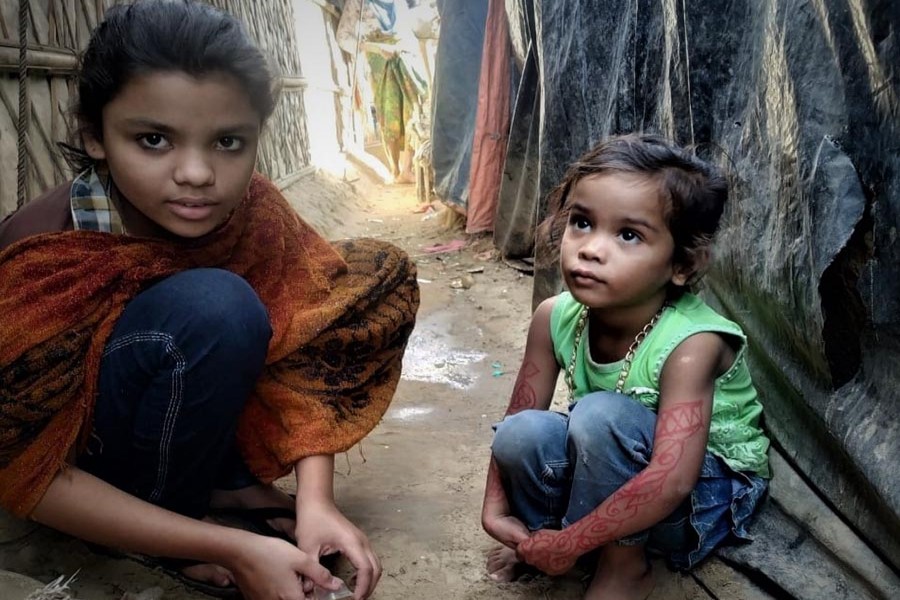Refugee populations represent one of the most marginalised groups in whichever host country they come to settle and this is clearly the case with Rohingya population, a majority of whom are now living in Bangladesh. The United Nations High Commissioner for Refugees (UNHCR) defined a refugee as someone who "owing to a well-founded fear of being persecuted for reasons of race, religion, nationality, membership of a particular social group or political opinion, is outside the country of his nationality, and is unable to, or owing to such fear, is unwilling to avail himself of the protection of that country".At the end of 2020, there were more than 82 million forcibly displaced people worldwide as a consequence of violence, oppression, war/conflict, human rights abuses and serious public order-disturbing events.
The Rohingya and other refugees arrive in their host country with major disease burdens, including physical and psychological conditions. Refugees generally settle in low-income areas where they go and are largely underserved by all or any health promotion and protection programs that exist for or cover the majority population. A research study in the San Diego area of the United States (US) determined that the major health needs among refugees included mental health conditions, hypertension, dental health, nutritional issues, and reproductive health. Clearly, a country like Bangladesh has not yet been able to reach out to all its mainstream population and existing healthcare services in many of these dimensions are not adequate; understandably the ethnic minority, rural and remote population groups and the refugees are not in its priority list.
Refugees including Rohingyaexperience an increased risk of psychiatric morbidity due to the nature of their forced migration and traumatic life events, such as going through starvation, witnessing violence, experiencing torture, or the premature death of family or friends. Other stressors that contribute to poor mental health may include having to leave family behind in Myanmar or the country of origin, acclimatising to a completely new environment and culture, and starting a new life at the bottom end of the socioeconomic gradient. There is evidence the local Bengali people in the settlement areas did not always welcome Rohingya who they in many occasions considered as unwanted, inferior or intruders. Studies in the US comparing health access and mental health outcomes between refugees and the general population have found that the refugee community experiences a greater risk of adverse health outcomes.
Refugees continue to experience barriers in all host countries in accessing and receiving the health care much needed to meet their needs. Language, cross-cultural communication, access to a hospital or clinic, access to an easy mode of communication like a telephone, and financial barriers are the main reasons why refugees may not receive health care. All of these apply to the Rohingya population who has been living in cramped and isolated camps since their arrival in Bangladesh.
Physicians (e.g., general practice and pediatricians with MBBS degrees) are usually considered the first line care providers of primary care and medical prevention and treatment in any country including Bangladesh. However, a large segment of population in Bangladesh particularly in rural and remote areas, of lower socio-economic status and lower literacy still seek healthcare from traditional, alternate or under-qualified practitioners and providers.It is always recommended that regular check-ups by physicianare done to ensure that a patient is in good health and thatthe patient is diagnosedto thwart any potential more serious illness from developing. Primary care physicians are also the gateway to referrals for more specialised medical care and are consideredas a "home base" of health care, where there is a physician who is familiar with the individual patient, even as the patient visits various specialty clinics, drug stores, and other health care providers. In order to institute ongoing care after a refugee's arrival period, founding a primary care physician with appropriate cross-cultural understanding and interpreter access is key.
Physicians and other primary care providers often experience challenges when treating refugees, such as the increased difficulty of communicating across language and cultural barriers, not having the knowledge of how and if the refugee can pay for the services provided or needed, and uncertainty with making appropriate referrals. They may generally have a limited understanding of refugees and their healthcare needs. Rohingyashould have access to language assistance requiring organisations and healthcare providers to have a system to help those with limited Bangla skills. Mostdo require access to medical interpreters where they go to seek care including emergency rooms. However, there is anecdotal evidence that many physicians turn down new refugee patients.
It is evident that the refugee population such as Rohingya in Bangladeshis in need of quality health care access and support. However, several studies have found that access to healthcare has become one of the most challenging aspects of the refugee resettlement experience. Refugees who are accepted in Bangladesh under refugee status deserve accessing timely, adequate and quality healthcare and the national and international organisations must collaborate in identifying and removing the existing barriers.With the multitude of health inequalities that refugees face as they begin resettlement, the most strategic approach to address these problems is through developing a well-functioning and welcoming primary health care delivery system with active outreach programs on health education and promotion.
Hasnat M Alamgir is a Professor of Public Health.


